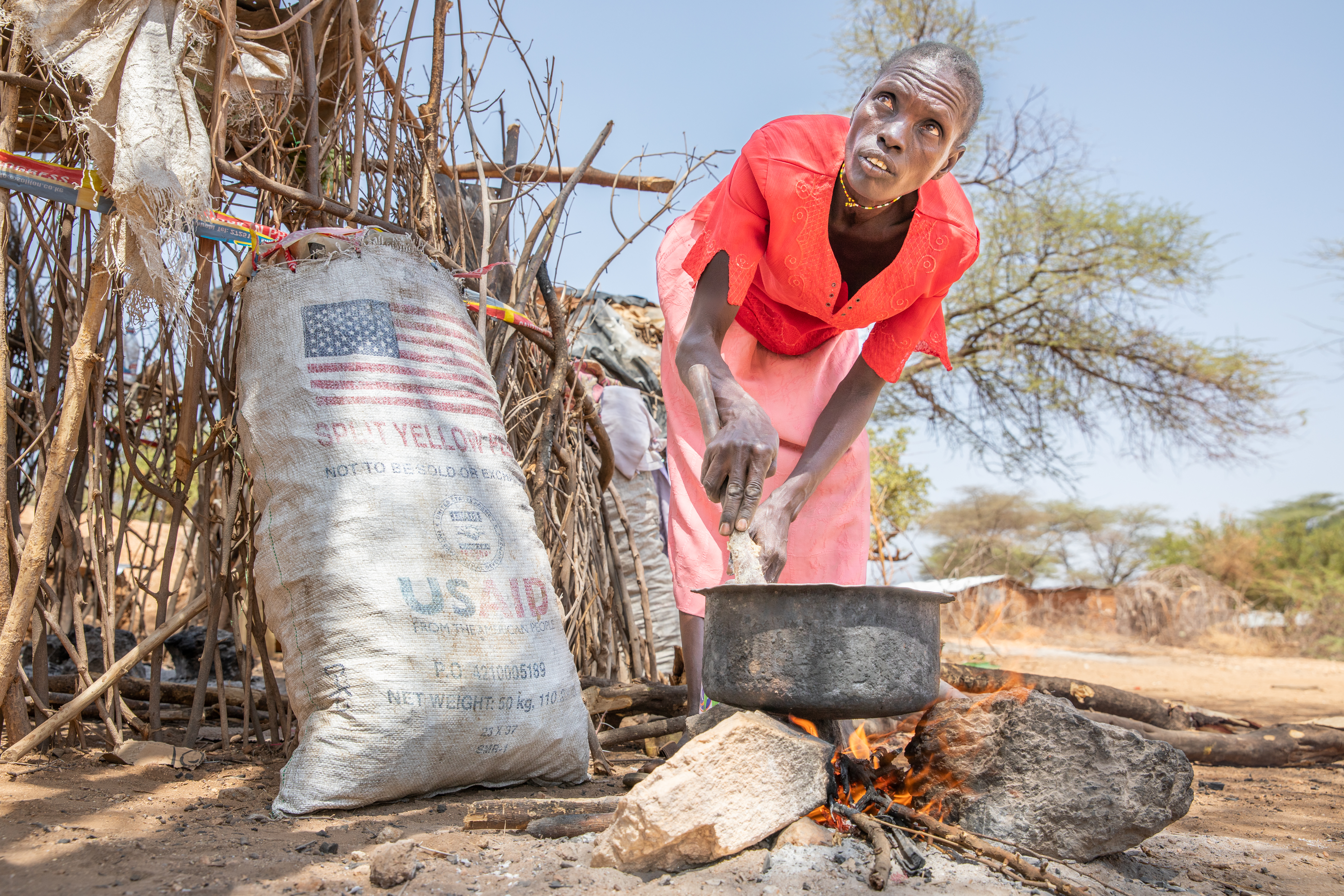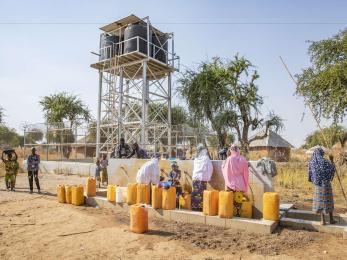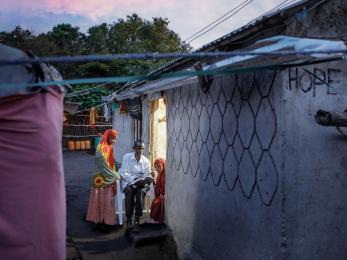A Gaza team member shares her story: “It’s beyond catastrophic”
By “Nasma,” Mercy Corps Team Member in Gaza (alias used for security)
Gaza is in the midst of a humanitarian catastrophe of historic proportions. Unrelenting bombardments from air, land, and sea and urban warfare across the whole of the Gaza strip are devastating civilian infrastructure like schools and hospitals. At the time of writing, more than 19,000 people—the vast majority of whom are women and children—have reportedly been killed in Gaza, with thousands more believed to be trapped under the rubble. In the city of Khan Younis, supplies of food, water, fuel, and other basic necessities are depleted and most essential services have completely collapsed.
In Rafah, in the south of Gaza, a Mercy Corps team member shares her experience of the dire humanitarian crisis. Nasma (whose name has been changed for security purposes) is witnessing families arrive in Rafah, amid the movement of more than 1.9 million people—90% of the population of Gaza—who have fled their homes after intensive bombardment of northern Gaza. Southern Gaza is now under expanding military operations and constant airstrikes. Even as Nasma and her community are experiencing this crisis, she continues to ask, “What am I, a humanitarian worker in Gaza, doing to help? What can I do?”
A humanitarian worker’s perspective
I am a humanitarian aid worker living in the middle of one of the worst humanitarian crises of our time, but I feel completely helpless to do anything. There is no food, no water, no medicine. People are sick and dying all around us; disease is spreading. Every single person is in need, the problems are endless, and yet, what can I do?
The words “despair” and “frustration” cannot adequately express the depth of my feelings. I wish I could shelter all of the people I see now living in the streets in my heart and protect them from the violence and cold nights. And yet, we too, as humanitarian workers are not immune to this suffering.
If we are lucky enough to survive, from now on, everything in life will be marked as the time before and after 7 October.
The words ‘despair’ and ‘frustration’ cannot adequately express the depth of my feelings.
Before 7 October, I was a mentorship coordinator with Mercy Corps in Gaza. With nearly 70 other team members, I proudly worked to improve the well-being of our community members and address pressing humanitarian needs stemming from repeated conflicts in recent years, and from the effects of Israel’s 16-year blockade of Gaza.
I worked with Gaza Sky Geeks—a Mercy Corps-supported tech hub and startup accelerator—where I connected our community of over 25,000 Palestinian youth with international experts, mentors, and coaches in business and tech. Every day, I tried to bring the world to them because, living under blockade, it was so hard for them to connect with the world. I wanted to help them have all the resources they needed to excel and create meaningful livelihoods and businesses despite the difficult circumstances in Gaza.
All of that changed after 7 October. Being a humanitarian worker, I wanted to help immediately to address the needs arising from Israel’s bombardment and siege. But early on, Mercy Corps’ main office in Gaza City was severely damaged by Israeli bombardment, as were several vehicles. When the telecommunication network crashed, there were periods when we could not communicate with our team, which made it even harder to coordinate efforts to try to help.
In early November, we somehow managed to purchase and distribute some food kits with biscuits, tuna, dates, and other food items to about 1,000 families in central Gaza, Khan Younis, and Rafah. This was nowhere close to enough to meet the scale of need in Gaza. But at least we could do something. Soon after, supplies were completely depleted, and we weren’t able to provide assistance.
After 7 October
During the past two months, death has approached me many times. I have seen things I never in my life thought I would see: parents crying over the bodies of their dead children; dead bodies and severed body parts after bombings; families struggling to find enough to eat; people gathering scraps of wood to build fires for heating and to cook food, and having no choice but to use donkey carts for transportation because of the lack of fuel.
Yet, I know as hard as it is in Rafah, in the south of Gaza where I live, I am still luckier than others who lived in the north who have completely lost everything.
Even in the south, we had to evacuate our house at the beginning of this war. But the house next to the one where we sought shelter got bombed, killing 13 people. The house belonged to my brother’s best friend's family. We used to go there to charge our phones. When the bomb struck, shattered glass flew everywhere. I could hear the screams. My brother tried to look for his best friend under the rubble.
After that, we felt nowhere was safe anymore. So, we took our things and came back to our house.
Now, every night, we try to guess which spot will be the safest in our house. My mom insists on sleeping with me and my siblings, even though it is very crowded, so that if we die at night, at least we will die together.
The thoughts of death and terror come to my mind when I close my eyes. I don’t know what I fear more: losing a family member or suffocating under the rubble. Which is worse: to be alive and suffer, or to die suffering?
These are the problems I contemplate at night. We rarely sleep, and if somehow we quiet our minds long enough to doze off, the explosions wake us up. Most nights, we get maybe two hours of sleep before waking at 4am to wait in line at the bakery for food and water. All our days have become about survival, getting some basic things for our family to eat or drink. To exist is a struggle.
One of my colleagues at Mercy Corps lost his wife. He is now a single father of their two children. Another colleague got married just days before 7 October. Since then, a single Israeli strike killed more than 30 of his relatives. Another colleague has a new baby that turned five months old during this war. And one of our Gaza Sky Geeks participants, who I believed was going to change the world, was killed by an airstrike with her entire family.
All of us are suffering and struggling just to keep our families alive.
We have lost so many community members and local mentors who were the lifeblood of our work. It feels like our bones are melting inside our chests without being able to help or shelter them.
Many of us who live in the south of Gaza have donated clothes, mattresses, food, and blankets and are even hosting many of our displaced colleagues in our homes. All of us are suffering and struggling just to keep our families alive. Despite everything that has been happening and how much we have lost, we are all eager to do more to help.
Life since the end of the humanitarian pause
During the temporary humanitarian pause in fighting from 24 November to 1 December, we were finally able to gather some of our team members in an office in Khan Younis to brainstorm how we could help. It was therapeutic in a lot of ways. Seeing each other briefly gave us hope that maybe we could begin to do something to address the immense suffering around us. But it all came to an abrupt end after the truce collapsed.
There are around 1.9 million people displaced in Gaza—over 85% of the population. Since the truce ended, it feels like there are over one million people now in Rafah, which was home to around 200,000 people before the war. The Israeli military is closing in on Khan Younis, the city just to the north of Rafah, and tens of thousands or hundreds of thousands of people are now fleeing here.
Since the pause ended, everything has been much worse in the south. There have been more airstrikes nearby. We live close to a hospital, so we hear all of the ambulances and the screams. We see trucks loaded with people who are injured and people running to the hospital to check on their families.
Every house in Rafah is hosting at least four families of displaced people. In my house, we now have five families—about 25 people, including the families of two of my colleagues. Everyone staying with us is getting sick, living in such close spaces. Our neighbors have at least 70 people staying with them.
It’s beyond catastrophic. Pregnant women, babies, children, the elderly, and disabled people are sleeping in the cold on Rafah’s streets with barely enough clothing, covered with plastic bags as they sleep on concrete because the UN and government shelters are full. My heart is aching to see the suffering everywhere. It is even difficult to breathe as people are using cooking oil to fuel their vehicles and the air is so polluted.

We can barely find any food or water now in Rafah. Every day, we stand in long queues—queues for cooking gas, fuel, water, food, and at banks. I don’t know of any bakeries that are still open. My friend went to wait in line for flour every day for three days, but never reached the front of the line. Finally, on the fourth day, he got in line at 3am and at 11pm he got a little bit of flour—enough to make bread for one day.
There is extremely limited aid coming in now since the ceasefire ended. There are people here in Gaza and outside the borders of Rafah who are so desperate to help. We must be allowed to do our jobs; to deliver assistance to those in need. We cannot do that without a way for supplies to come into Gaza, and without safety guarantees for aid workers, and without assurances that civilians won’t get bombed trying to get a loaf of bread for their families.
We must be allowed to do our jobs; to deliver assistance to those in need.
I feel privileged to be an aid worker and to share my story, but there are so many stories that are untold that are much worse and more heartbreaking than mine. The only thing I hope for is for a ceasefire so I won’t go to bed wondering each night if my family and I will live to see the morning.
I ask myself, “What am I, a humanitarian worker in Gaza, doing to help? What can I do?”
I hope that the next time I’m asked this question, there will be a ceasefire and we will be channelling all this frustration and helplessness towards supporting our community and making an even greater impact than before.
This story was originally published by The New Humanitarian.


